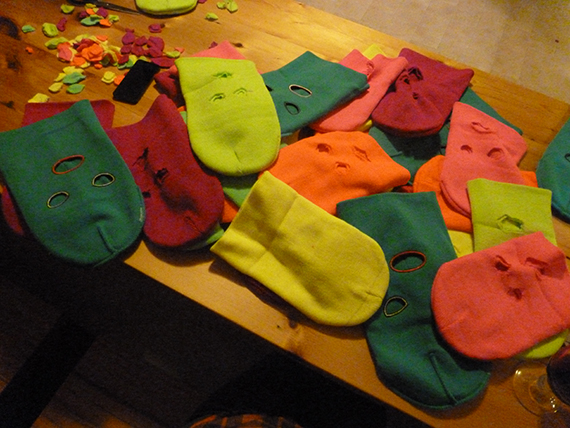
The trademark balaclavas that kept Pussy Riot band members anonymous are now worn at protests around the world.
When Colgate’s new Russian and Eurasian Studies (REST) program promised not only a Russian menu, but also cloth headgear and the titillating-sounding topic of the Pussy Riot phenomenon, they had a winning formula.
(Pussy Riot is the feminist, subversive band whose members have been in prison since March for performing an anti-Kremlin “punk prayer” in a cathedral in Moscow. The arrest and subsequent two-year sentence for the group members spurred an international outcry and the band is now considered one of most influential figures on the international art scene.)
The Sept. 26 event — Baklava and Balaclavas: Panel Discussion and Open House — filled the ALANA Cultural Center with past, present, and future students of the program and faculty from across the social sciences and humanities who teach its courses.
“Russian performance and politically charged art practices have never been more in the international eye than in these months following the Pussy Riot trial,” said Marijeta Bozovik, associate professor of Russian whose courses at Colgate have included the first-year seminar Total Art: Russian and Soviet Film, and The New Russians: Post-Soviet Literature, Art and Film.
“There is an authentic and organic demand for knowledge on topics pertaining to performance and protest, the new left, and Russian culture today,” said Bozovik. “The media coverage has left academics and broader audiences alike longing for more information grounded in the historical and theoretical perspectives that trained Russianists and comparativists can offer.”
At the event Victoria Kouznetsov ’13 presented some of her senior thesis research. Born in Oberlin, Ohio, to a Russian father and American mother, she spent last summer is Russia where she saw first-hand some of the demonstrations in support of Pussy Riot while they were on trial.
“I outlined some important points that my thesis will take into consideration,” she said. “including post-Soviet Russian nationalism, the role of Russian Orthodoxy in this nationalism (and the lack of a separation between church and state), contradictions in the West’s support of Pussy Riot (who are extremely anti-capitalist, and not unwilling to criticize the West), and the ramping up of Cold War politics, among other things.”
Kouznetsov said that in her thesis she hopes to contextualize the Pussy Riot phenomenon in terms of ideological, cultural, social, and political forces shaping contemporary Russian civil discourse.
“This is a time of flux in Russia’s history, full of nuances, grey areas, and contradictions,” she said. “To many inside and outside of Russia, a culture war has opened up and the country’s future seems up for grabs. It is necessary now more than ever to avoid simple explanations devoid of details, and instead to submerge oneself in the incredible diversity of Russian print, visual, performance, religious, protest, feminist, nationalist, and political culture to get the full story.
“There’s just too much fascinating, cool stuff out there to restrict oneself to sound bytes!”